As a solopreneur website owner and digital marketing expert, I know that it’s essential to make the right choice when selecting the best digital marketing tools for your business growth. When it comes to learning competitive analysis, SEO, and how to improve your digital marketing strategy, the two names that come up most are Similarweb Vs SEMrush.
Not only that, but they both provide a variety of features to help you improve your online marketing strategy- though in different ways.
So, how do you make the decision in between them? In this extensive comparison article, we are going to explore the main features, pricing and use-cases of Similarweb vs SEMrush so you can make an informed decision about which one is more appropriate for your business.
Insights on Similarweb Vs SEMrush?
Before I make the comparison, it makes total sense to know what SimilarWeb vs SEMrush are –and how they work. Bothe are robust but really do serve different needs in the world of DM.
Similarweb
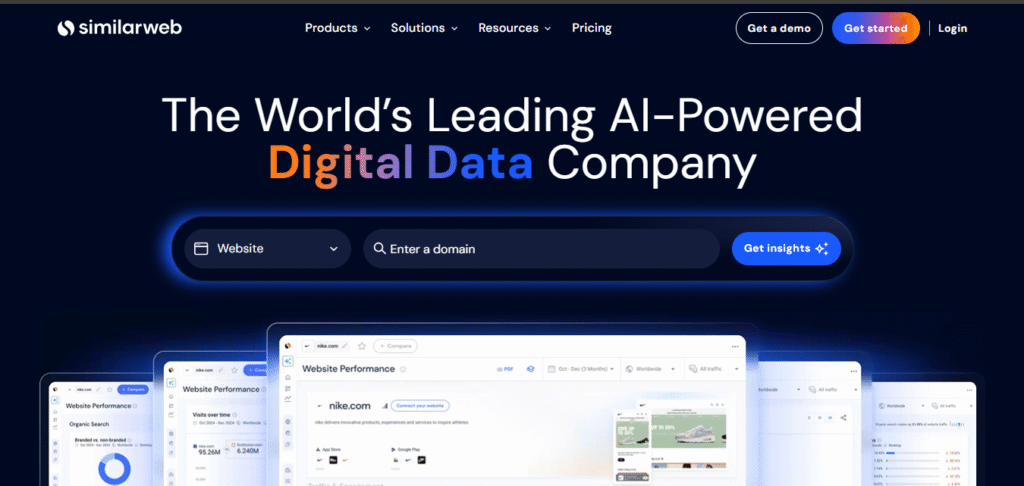
Similarweb is an all-in-one tool mostly used for website traffic analysis and competitive intelligence. It collects information from different online platforms to provide reports on website traffic, user engagement, spectator behavior and market trends. This one is more for businesses that are looking to understand how they compare in the market against their competitors.
Key Features of Similarweb:
• Traffic Analytics: Delivers valuable intelligence on a website’s traffic sources, engagement, and geography.
• Market Intelligence: Assists businesses in recognizing trends and patterns within their industry, including recent changes to user behavior and competitors.
● Competitive Benchmarking: Enables companies to benchmark performance against competitors through competitive traffic data analysis.
Similarweb is Best for Getting macro level insights to make informed decisions in competitive market. By studying traffic trends and engagement activity across segments, it offers a comprehensive view on the market.
SEMrush
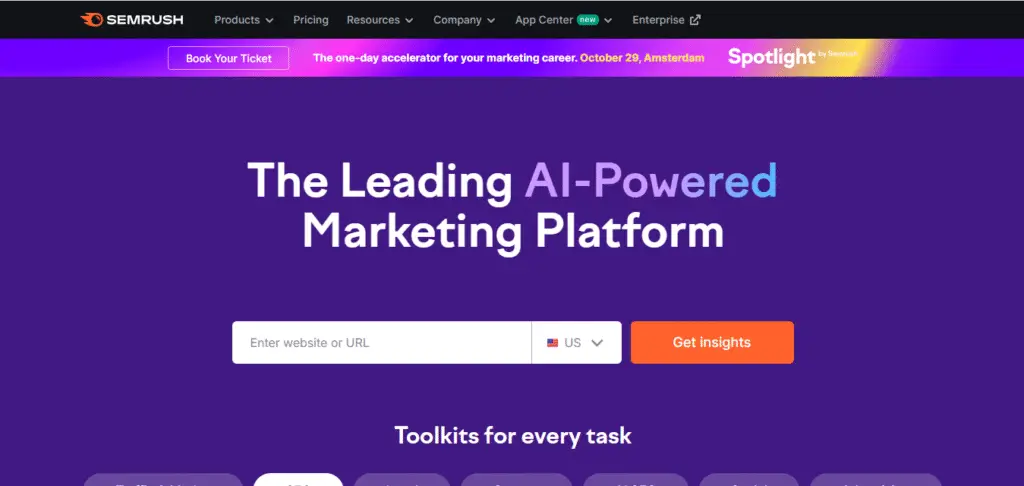
SEMrush as the name goes is an integrated SEO and digital marketing tool. Best known for its powerful features that let businesses and marketers build and optimize websites for search engines.
SEMrush covers all aspects of online marketing from keyword research to backlink analysis and site audits. On top of that, SEMrush offers utilities for managing content marketing, pay-per-click (PPC) ad campaigns and social media engagement strategies.
Key Features of SEMrush:
• SEO Tools: Advanced keyword research, backlink analysis, and site auditing.
• Content Marketing: Access keyword discovery tools and content analysis that will help you make the best landing page.
• Paid Media: Provides visibility into PPC campaigns and ads run by competitors.
About SEMrush In 2008, the first SEMrush tool was launched to analyze top keywords for any domain. From doing keyword research to checking the SEO health of your site, or finding out what it will take to get a specific page ranking on page 1 in Google, SEMrush is my go-to tool.
They are valuable to use in harmony with one another, but they do not really have the same purpose. Here is a closer look at how they stack up.
Key Features: Similarweb vs SEMrush
We’ll delve into the features of both tools so you can better understand how they measure up in real-world terms. Whether you need deep traffic analytics or competitive analysis, we’ll give you an overiew of what each tool offers.
Traffic Analytics: Similarweb
Similarweb is one of the big players when it comes to learning about website traffic. Its traffic analytics features provide robust information on sources of website traffic, as well as how the audience is behaving and engaging with the site. Business analysists who want to know from where traffic come and to know the users behaviour on site can get immense help from this.
Some Of The Key Feature Traffic Analytics from Similarweb:
• Page Views: Traffic to a website or webpage. This can help you gauge overall health and traffic of your site.
• Traffic Sources Breakdown: Know where the traffic is coming from, search and social media traffic data for example. That breakdown provides a way to identify which channels are sending you the most valuable visitors.
• Geographic Reports: Get insight about the location of a site’s visitors, and where its traffic is coming from. This could enable businesses to decide where they should expand in an international market or target with local advertising.
• Audience Demographics: Understand the age and gender of a site’s visitors, and analyze audience Interests of what your users are interested, find out what they do on your website through sophisticated tools.
From this list you can personalize your marketing programs to these best-fitting customer segments.
• Comparing With Competitors: you can check the traffic of other competitors and it’s quite invaluable if you’re benchmarking or whether putting together a marketing strategy.
Similarweb is priceless for the data you can use to understand traffic patterns and behavior, getting to know your market and where fits in.
Keyword Research: SEMrush
Very few tools can compete for SEMrush’s level of in-depth keyword research. With SEMrush you can discover new keywords, check search volume, track rankings, and most importantly analyze how hard it is to rank for them.
Main Features of SEMrush Keyword Research:
• Keyword Analysis: Get intellectual analysis about keyword search volume, competition, and trends to make better decisions for which keywords to target.
• Keyword Difficulty: You can use SEMrush’s keyword difficulty score to find out about how competitive a given keyword is and rank your prioritize efforts based on what you discover.
• Keyword Gap Analysis: You can see what keywords you should be targeting, and keyword opportunities your competitors are ranking for that you aren’t.
• Local Keyword Research: So, if your business targets them locally then SEMrush is the best tool to conquer local SEO ranking by having access to location wise keyword data.
With such powerful keyword research capabilities, SEMrush is the tool of choice for businesses looking to improve their site’s search visibility.
Whether you’re looking to capture local or international traffic, SEMrush’s tools gets the job done in finding the keys terms which will help you on your way in you boosting your visibility online.
SEO Auditing: SEMrush
SEO audits are crucial in order to find and fix any technical problems that might affect the way your website behaves within search engines.
SEMrush has one of the most thorough SEO audit tools on the market, no doubt about it; it’s easy to identify and fix all sorts of issues.
Highlight Features of SEMrush SEO Audits:
• Site Health: Measure your website’s overall SEO health and get suggestions to improve performance. It’s a terrific way to zero in on critical aspects that influence your rank and put effort towards effective SEO.
• On-Page SEO Issues: Find technical issues on your site affecting rankings for your target keywords, such as title tags, meta descriptions, header tags and much more. SEMrush will present you with recommendations in order to correct these on-page SEO mistakes.
• Technical SEO: SEMrush makes it easy to find problems such as slow page speed, broken links, duplicate content and crawl errors. These technical nuances can make a big difference in your SEO results, and this is all stuff that SEMrush shows you so that you can optimize it.
• SEO Advice: SEMrush doesn’t just identify the issues it also gives you clear advice on how to fix them.
SEMrush offers the best SEO audit features for companies seeking to optimize their websites and rankings within major search engines.
Competitive Intelligence: Similarweb
If you are looking for competitive analysis, Similarweb has a strong suit. The tool is built to specifically assist in monitoring your competition’s traffic sources, user engagement and more so that you can get a leg up on the competition.
Features of Competitive Intelligence in Similarweb:
• Site Traffic Comparison: Similarweb shows you your site’s traffic compared to competitors, so you can compare the strength of your market and areas where you could be doing better.
• Audience Insights: You’ll be able to discover who visits your competitors’ website, and use this data to know who you should target as a potential customer segment for which you can design an actionable marketing plan.
For businesses trying to acquire new markets, or the most relevant ones, this is particularly handy.
• Industry Benchmarks: Similarweb provides industry benchmarks which help benchmark the performance of your website compared to other websites within a specific industry. This data guides you to see where your company is compared to others within your industry and where you can fit in.
This granular analysis of your competitors’ performance is priceless for businesses eager to outshine their competition and make strategic decisions based on data. Understanding how your competition is succeeding and where they are falling short can enable you to take advantage of gaps in the market.
Backlink Analysis: SEMrush
As backlinks are one of the most important search engine ranking factors, you will want to ensure that your off-page SEO is up-to-par- and with SEMrush’ vast backlink analysis tool, it’s easy.
With SEMrush, you can audit your backlink profile including the links pointing to your competitors’ domains and find the harmful ones that may have a negative effect on your rankings.
Here are some important features of SEMrush’s Backlink Analysis:
• Backlink Audit: Discover toxic backlinks that can undermine your website’s SEO. The audit feature enables you to find any toxic links and disavow them before they hurt your ranking.
• Competitor Backlink Analysis: Discover new backlink building opportunities by finding out where your competition is getting their links from. Cloaking tools help them hide their footprints on the SEO of external backlinks.
• Backlink Overview: Receive an in-depth overview of your backlink profile which includes the total amount of backlinks and referring domains as well as link quality. This allows you to keep track of how many links you’re building and the success rate of your outreach.
Similarly, for companies that are more interested in boosting their SEO with link-building, the SEMrush set of backlink tools is must-nave.
Pricing: Similarweb vs SEMrush
When choosing a digital marketing program, the prices stood out to me. Pricing: Similarweb and SEMrush both offer pricing options for various business needs. Let’s break that down and see how the pricing compares.
Similarweb Pricing
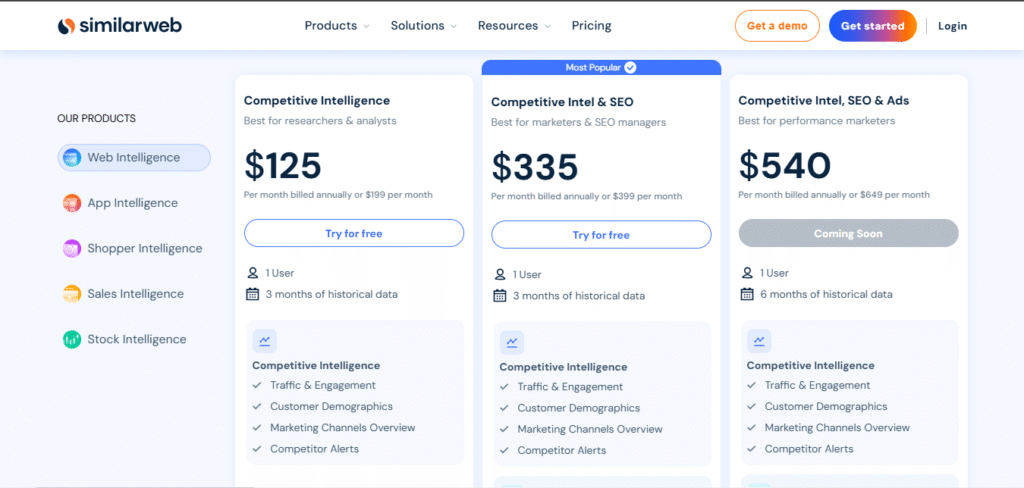
Similarweb has a number of pricing tiers, but its free version provides very limited access to basic traffic data for a small set of websites.
The Pro option of paid plans is available at approximately $199/month and up. If you want more advanced features and need to work with larger data, you’ll have to upgrade to higher tier plans, which can become pricier.
• Free Version: Fundamental information on a few sites.
• Pro Plan: Beginning at $199 a month, with more comprehensive data and benefits.
• Enterprise Plans: Business-sized organizations that need more data, analytics and a custom price.
With its rich capabilities and corporate-class functionality, Similarweb is more appropriate for large businesses or other companies that spend a great deal of time on competitor research and market analysis.
SEMrush Pricing
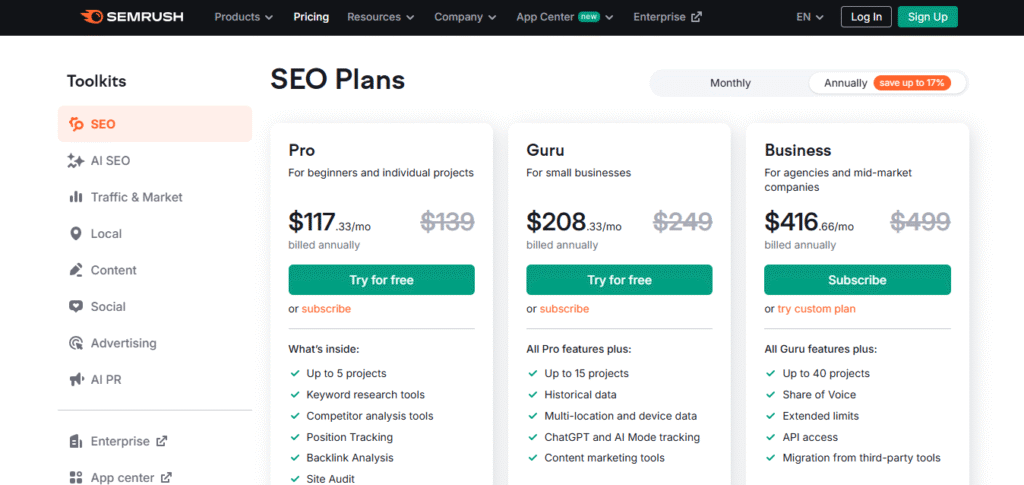
SEMrush also has different pricing tiers, beginning with the Pro plan at $139/month. The Guru plan is priced at $249/month and the Business plan at $499/month. SEMrush’s more premium plans come with advanced features such as historical data, content marketing and better reporting.
• Pro Plan: $139 per month – Best for individual entrepreneurs and small businesses.
• Guru Plan: $249/month – Ideal for medium-sized businesses with bigger needs.
• Business Plan: $499/month – For agencies and large companies.
For small-sized businesses or freelancers the Pro plan should be suitable, but if you require extra features or more comprehensive reports, you would like to consider the higher level packages.
Similarweb vs SEMrush: When to Choose?
Similarweb and SEMrush play different roles, which means it all depends on what your business needs.
When to Choose Similarweb
Similarweb- For Focus on: BuiltWith – For a focus on: If you are primarily concerned with then perhaps use Similarweb HothBrickAlternate to see website technology usage.
• Competitive Intelligence: For monitoring your competition and getting insights about their traffic sources, audience demographics and so on, Similarweb is the best option.
• Market Research: If you want to know more about industry trends, audience behavior and overall market dynamics, then similarweb ’s data can be very useful.
• Benchmarking for Websites: If you want to benchmark your website against industry benchmarks or competition, Similarweb provides robust benchmarking capability.
When to Choose SEMrush
On the flip side, go for SEMrush if you’re concentrating on:
• SEO Tools: If one of your main goals is to improve search-ranking results for your site, you’re perfectly suited for SEMrush’s comprehensive keyword research as well as their SEO audit tools.
• Content Marketing: Find topics that are trending, discover keyword opportunities, and tailor your content strategy accordingly with SEMrush.
• PPC Campaigns: If you’re running paid advertisements, SEMrush provides a treasure trove of information about what your competitors are doing on the paid media side.
Similarweb vs SEMrush: Which One Is Better for Your Business?
In the end, selecting from Similarweb Vs SEMrush comes down to the goals of your business.
If SEO and digital marketing are your bread and butter, then SEMrush is probably your best bet.
It has an all-in-one SEO toolkit, keyword research tool, and backlink analysis options is the most standard option in the arsenal of a business that wants to optimize its website and enhance its position on State of Search.
But, if you are looking for a much more in depth analysis on competitors and market research, Similarweb offers unparalleled competitive intelligence.
Its rich traffic analysis tools and industry benchmarks are ideal for companies that want to monitor the strategies of its competitors and get a sense prevailing market conditions.
In a lot of cases, businesses may be well-served using both. You can then use SEMrush to optimize your website and marketing efforts, and utilize Similarweb to track competitors’ progress in addition to industry trends.
Similarweb vs SEMrush: Final Thoughts
In short, it all depends on what you want to achieve with your marketing when you’re deciding between Similarweb Vs SEMrush. They both are strong and have their individual strengths when it comes to SEO, competitive intelligence and digital marketing strategies.
For a business of just one person like mine, the most useful tool in SEMrush’s suite is my trusty ally when it comes to optimizing my site for organic search traffic.
But when I want to keep an eye on my competitors and follow industry trends to stay ahead of the curve, Similarweb has been absolutely indispensable.
Make the best choice for your business and invest in the tool that can help you further develop your online presence, reach new goals and attract larger audiences.
Click here to read my article on Semrush Vs SEO Powersuite.
FAQs
-
Similarweb vs SEMrush: What is the difference?
Similarweb is the leading competitive intelligence and web analytics company. It helps discover traffic sources, monitor your competitors’ Ad strategies, gain insights about the market share and track shares of visibility.
SEMrush, however, is an all-singing-, everything-in-one digital marketing tool that includes SEO and PPC tools, plus content marketing tools and backlink analysis. It’s more geared towards improving a website’s performance in SEO, tracking keyword rankings and performing comprehensive site audits.
Difference Between Similarweb and SEMrush: Which one is the best for You? (Hint – choose wisely!). If you happen to be in the digital marketing space, then it’s quite likely that you’re going to make use of some kind of a keyword tool.
-
Which is more effective tool for competitive analysis – Similar web or SEMrush?
Similarweb is better if you are doing competitive analysis. It focuses on detailed traffic profiling, competitor benchmarking and audience demographics. With Similarweb, companies can compare their website traffic with competitors and analyze market trends to give them a better understanding of the competitive landscape.
SEMrush provides a little bit of competitive intelligence, particularly when it comes to SEO and backlinks, but the tool’s orientation is definitely towards helping you optimize your website — not specifically toward deep examination of competitors. -
Is it possible that SEMrush can make my site better optimized SEO-wise?
SEMrush is arguably the best tool to increase SEO of your site. It offers strong attributes for keyword exploration, backlinks scrutiny, site audits and position tracking. With SEMrush, you can check your website for SEO issues, learn new keywords that you can target, and study the strategies of your competitors to improve your own.
Key Features for SEO:
• Keyword research and difficulty analysis
• Comprehensive SEO site audits
• Backlink tracking and comparison
• On-page SEO suggestions -
Does Similarweb has its own keyword research tool?
Similarweb is amazing and it’s awesome to gather competitor data, however it doesn’t have great keyword tools like SEMrush. As a keyword research tool, SEMrush really shines in its ability to find profitable keywords and analyze search trends as well as tracking the keyword position of your site.
If your biggest requirement is advanced keyword research for SEO, SEMrush takes the cake. But, if you’re looking for at-a-glance information on how various sources of traffic (including search) are performing for your competitors – Similarweb can dish that up.
-
Is SEMrush the right choice for small businesses or freelancers?
Yes, it’s ideal for small business and freelancers. Their Pro Plan is available from $119.95 per month which gives access to some very strong SEO tools, keyword research and site audits for individuals or smaller teams. Businesses can also upgrade to higher tier plans as they grow with comprehensive features.
SEMrush Pro Plan includes:
• 5 projects of monitoring and analysis
• 500 keywords for tracking
• 100,000 pages for crawling via Site Audits -
How much does Similarweb and SEMrush cost?
Similarweb Similarweb has a free version with limited access to their traffic data, but it offers a collection of premium plans beginning at $199/month for its Pro Plan. Costs go up with broadened features such as advanced analytics and industry data.
SEMrush has a free version (with limited access) and paid plans that begin from $139 per month for its Pro Plan, which gives you all-in-one access to SEO tools, PPC tools and content marketing tools etc. More features for growing businesses & agencies All of our mid and top level plans even include unlimited follow-up reminders.
Pricing Summary:
• Similarweb: Free plan (limited data), Pro plan from at $199 per month
• SEMrush: Free plan (with limits), Pro plan from $119.95/month.











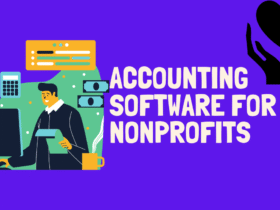
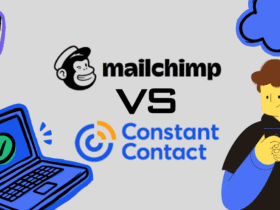
1 Comment